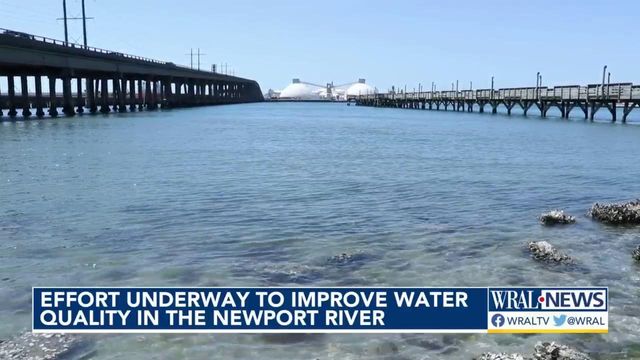Effort to restore Newport River a point of pride for those in Carteret County
North Carolina set a goal for its shellfish industry to exceed $100 million annually by 2030.
In order to do that, shellfish harvesters and growers need clean water to cultivate clams and oysters. Several groups have come together to restore the Newport River.
The Newport River is a place where people work, live, and enjoy the beautiful water. People like Steve Weeks have embraced the river's scenic beauty for decades.
“I grew up where we’re standing and this particular piece of property was purchased by my grandfather in 1929 and he built an oyster shucking house and it’s been passed down through the family.”
Weeks is not just out on the river for a relaxing afternoon - he’s a shellfisherman. But the river isn’t what it used to be, as pollution has lessened the amount of water that can actually be used to harvest shellfish.
“It seems like every year more and more acreage of the river is being closed,” Weeks said.
Right now, nearly 40 percent of the river is closed because of poor water quality.
“The Newport River has actually been listed as one of our endangered shellfish growing waters in North Carolina and, while it is endangered, it’s actually extremely important economically.”
To save the river- stakeholders from around Carteret County and the state must first determine where the pollution is coming from. The Coastal Federation and researchers from NC State are collecting water samples.
“We saw some surprising information on the first round of sampling which was done during dry weather so it was really baseline loads and it actually picked up some creeks that had high levels without rainfall.”
With that new data, the group must decide where to go from here.
“The goal of the plan is to figure out what is causing the water quality to deteriorate and how we might turn that around.”
After the research and plan development is completed, the team will then begin to try and implement the necessary changes.
“It’s a nice opportunity to look at what’s practical to be able to do to start slowing down some of that polluted runoff and to use the land more effectively to absorb water.”
For shellfish growers like Weeks, while the prospect of improving the water quality of the Newport River is exciting, he also sees this project as an opportunity to improve things on a larger scale.
“If we can save this river, then we can use what we’ve learned here to save other waters, it’s over a million acres in North Carolina I believe that are closed because of pollution and we need to reverse that trend.”
The Coastal Federation and the other groups involved in the project hope to have their plan completed by the end of next year.











